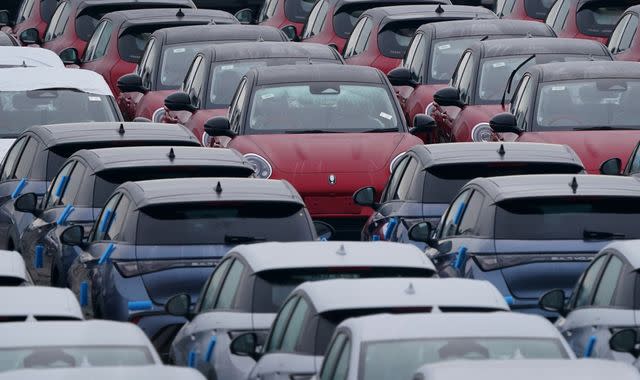Electric car UK market share shrinks, figures suggest

The proportion of battery electric vehicles sold in the UK car market has shrunk, according to new industry figures.
Some 15.2% of new cars registered in March were pure electrics, down from 16.2% during the same period last year, the Society of Motor Manufacturers and Traders (SMMT) said.
The industry body said the "tough economic backdrop" of low growth, weak consumer confidence and high interest rates was making it harder for drivers to "invest in these new technologies".
Year-on-year sales of electric vehicles (EVs) did rise during the month, but this was mostly driven by fleet investment, rather than from private drivers, the SMMT said.
Total uptake of hybrid electric vehicles rose by nearly 20% to 44,550 in March compared to the year before, while the registration of new battery electric vehicles rose by almost 4% to 48,300.
The SMMT's chief executive Mike Hawes said: "A sluggish private market and shrinking EV market share show the challenge ahead.
"Manufacturers are providing compelling offers, but they can't single-handedly fund the transition indefinitely."
It comes after leading electric carmakers Tesla and Chinese firm BYD both reported a sharp drop in sales during the first quarter of the year, prompting concern from some commentators that appetite for the vehicles could be declining.
Overall, the SMMT's figures, published on Thursday, said the UK car market grew for the 20th consecutive month in March, with a 10.4% rise in registrations.
The total of more than 317,786 cars was the UK's best March performance since 2019, although it was still more than 30% below pre-pandemic levels.
Registrations by private buyers fell by 7.7% and dropped by 8% among small businesses.
However, fleet investment in cars leapt by almost 30%, with "compelling tax incentives" driving the uptake of electric vehicles, the SMMT said.
The industry body renewed calls for the government to do more to incentivise private buyers to go electric too - including by reducing VAT on public EV charging.
"Government support for private consumers - not just business and fleets - would send a positive message and deliver a faster, fairer transition on time and on target," said Mr Hawes.
Read more from business:
Vodafone and Three merger in doubt
Space NK owner Manzanita plots £400m sale
Google may start charging for 'premium' searches
Ian Plummer, commercial director at Auto Trader, noted that electric vehicle sales were still rising despite the "gloom" from Tesla's recent figures.
He added: "While the fleet side of the market is driving the growth, more needs to be done to stimulate electric vehicle demand among private buyers where affordability remains a barrier.
"That said, manufacturers are fighting harder than ever to tempt customers, as more than three-quarters of new EVs are now advertised on our platform with discounts."
Alex Buttle, co-founder of used car comparison website Motorway, echoed the calls for the government to do more.
He said: "Greater charging infrastructure and tax incentives are what the industry needs to really power up the private EV market."
A spokesperson for the Department for Transport told Sky News: "The number of new electric vehicles and plug-ins sold overall is higher than last year, and this is in part thanks to government grants over the past decade, £2bn in investment and ongoing tax incentives.
"There are now over a million electric cars on our roads and we continue to help more people to make the switch to electric through schemes such as the £381m Local Electric Vehicle (LEVI) fund to rollout charging infrastructure."


